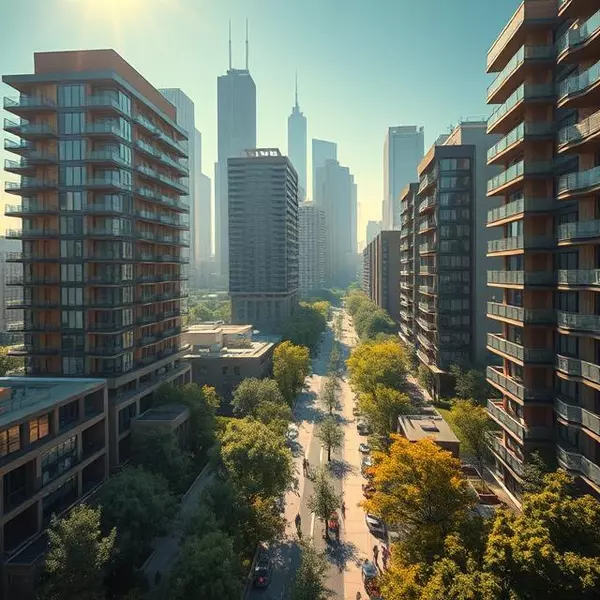What Changes 2025 brought us in Real Estate Market
The real estate landscape has undergone significant transformations in 2025, reshaping how we approach buying, selling, and investing in properties. As we dive into the current state of the market, particularly in Chicago, it’s essential to highlight the various changes impacting residential and commercial sectors alike.
Chicago Market News
Chicago has always been a vibrant hub for real estate activity, but recent trends indicate a shift in both buyer preferences and investment strategies. The city’s diverse neighborhoods continue to attract a mix of first-time homebuyers, seasoned investors, and commercial developers looking to capitalize on emerging opportunities.
One of the most notable changes is the increased demand for suburban living. Following the pandemic, many residents have reconsidered their living situations, leading to a surge in interest for properties outside the bustling downtown area. Suburban homes with larger spaces and access to green areas are now at the forefront of buyers’ minds. This trend has prompted developers to focus on constructing family-friendly communities that offer amenities catering to this new lifestyle.
Residential Market Update
In 2025, the residential market in Chicago is characterized by a competitive environment. Home prices have seen a steady increase due to low inventory levels and high demand. According to recent reports, the average home price in Chicago has risen by approximately 8% compared to previous years. This growth can be attributed to several factors, including low mortgage rates and an influx of buyers seeking more space as remote work continues to be a viable option for many.
Real estate agents are adapting their strategies to meet these evolving needs. Virtual tours have become standard practice, allowing potential buyers to explore properties from the comfort of their homes. Additionally, agents are leveraging data analytics tools to provide clients with insights into neighborhood trends, helping them make informed decisions about where to invest.
Commercial Market Updates
On the commercial side, 2025 has brought about its own set of challenges and opportunities. The rise of remote work has led many businesses to rethink their office space requirements. As companies adopt hybrid models that blend remote and in-office work, there is a growing demand for flexible office spaces that can accommodate varying workforce sizes.
In response, developers are transforming traditional office spaces into co-working environments that foster collaboration while offering flexibility for tenants. This shift has made Chicago an attractive location for startups and small businesses looking for adaptable solutions without long-term commitments.
Moreover, retail spaces are also undergoing significant changes as e-commerce continues to dominate consumer behavior. Retailers are reevaluating their physical footprints and focusing on experiential offerings that draw customers into stores rather than simply relying on foot traffic. Properties located in high-traffic areas with strong community ties are becoming increasingly valuable as businesses aim to create unique shopping experiences.
Investing Trends
For investors looking at Chicago’s real estate market in 2025, there are numerous avenues worth exploring. The ongoing suburban migration presents opportunities for those interested in single-family rentals or multi-family developments outside the city center. Investors who can identify emerging neighborhoods poised for growth will likely see substantial returns over time.
Additionally, with commercial spaces evolving into more versatile environments, there is potential for lucrative investments in mixed-use developments that blend residential and commercial elements. These projects not only cater to current market demands but also contribute positively to community development.
Changes in How Agents Work
As we navigate through 2025, real estate agents have had to adapt significantly due to technological advancements and shifting market dynamics. The reliance on digital marketing strategies has never been greater; agents are utilizing social media platforms and online listings more effectively than ever before.
Furthermore, collaboration among agents has increased as they share insights and resources within their networks. This cooperative approach fosters an environment where information flows freely—benefiting both buyers and sellers alike.
Moreover, training programs focusing on digital tools and customer relationship management systems are becoming commonplace among agencies. Agents equipped with these skills can better serve their clients by providing personalized experiences tailored to individual needs.
Conclusion
The real estate market in Chicago is evolving rapidly as we move through 2025. With shifts towards suburban living, changing commercial needs, and advancements in technology shaping how agents operate, it’s clear that adaptability is key for anyone involved in this sector.
Whether you’re a buyer searching for your dream home or an investor seeking new opportunities, understanding these changes will help you navigate the current landscape effectively. As we look ahead, staying informed about market trends will empower you to make strategic decisions that align with your goals in this dynamic real estate environment.
Categories
Recent Posts










